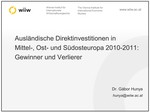Diverging Patterns of FDI Recovery (press conference presentation in German)

presented at: wiiw presents its new analysis of FDI developments: Diverging Patterns of FDI Recovery (07 Jun 2011), Ausländische Direktinvestitionen in Mittel- und Osteuropa: Gewinner und Verlierer (07 Jun 2011)
related Publication: Diverging Patterns of FDI Recovery
FDI is still of great importance for the development of CEECs especially as the domestic engines of economic growth are still weak, and fiscal consolidation drags on many of the economies. The economic recovery that has started in the region is mainly based on external demand, which has upgraded the role of foreign investors whose subsidiaries produce the main part of exports.
Not all countries can successfully participate in the FDI-generated export-led growth. Modest and uneven recovery characterized the development of FDI in the CEECs in 2010: overall an increase of 9% was registered (in current euro terms). Strong growth occurred in the Czech Republic, Latvia and Lithuania. Bulgaria, Romania and Southeast Europe booked another year of severe decline. Most of the CEEC FDI increase, however, took place in Russia where domestic demand was recovering.
FDI was attracted mainly by three factors: booming export demand, improving financial stability in host countries and the recovery in the financial position of investors. All three factors coincided positively in the Czech Republic and led to a big increase of FDI inflows. In Hungary, on the other hand, investment risks were accumulated in the financial and retail sectors due to extra taxes, but high amounts of new equity investments went into the export-oriented automotive industry. The number of new greenfield projects recovered strongly throughout the region but they promise less investment value than in the previous year.
The most important investing countries in the NMS are the Netherlands, Germany and Austria (based on end-2009 FDI stock data). The ranking has not changed over the past three years, but the position of the Netherlands has strengthened compared to Germany. Austria is the largest investor in Bulgaria and Slovenia and occupies the second place in Romania and Slovakia while its position is weak in the Baltic countries and in Poland. In Southeast Europe Austria is the primary investor in the larger countries, Bosnia, Croatia and Serbia, mainly by its banks.
The effects of the financial crisis were still felt in terms of declining profits of foreign investors. The profit rate was above 10% of the FDI stock only in the Czech Republic, fell to 8% in Hungary, Poland and Slovakia and was much weaker in Latvia, Lithuania, Bulgaria and Romania. The latter were the countries that had been hit hardest by the crisis and had also received rather low FDI inflows in the past two years. The share of FDI-related income that was reinvested was higher than in the previous year as a result of improving confidence, except in Latvia, Lithuania and Romania.
As to 2011, wiiw experts are more optimistic than global surveys and expect a 27% increase of FDI inflows to the CEECs. Russia will receive most of the increase; much of it, as in the past, will be invested by Russian off-shore companies. The proximity to highly developed European countries with growing economies is expected to attract substantial FDI in the NMS (+10%) and the SEE (+29%). Single large projects may influence this forecast, such as the Hungarian government’s purchase of the Russian stake in the oil company MOL, or the postponed privatization of the Serbian telecom company. In the longer run, proximity to the main EU headquarters and a good competitive position remain the two most important factors attracting FDI in export-oriented production and services, but to reach the inflow of the pre-crisis years consumption in the CEECs will have to recover as well.
German:
Das wiiw präsentiert seine aktuelle Analyse der Entwicklung der Auslandsinvestitionen in Zentral-, Ost- und Südosteuropa, sowie den Update der "FDI Database" mit detaillierten Statistiken über Auslandsinvestitionen in 20 Ländern.
Reference to wiiw databases: wiiw FDI Database
Countries covered: Albania, Baltic States, Belarus, Bosnia and Herzegovina, Bulgaria, Visegrad countries, Croatia, Czechia, Estonia, Hungary, Latvia, Lithuania, North Macedonia, Moldova, Montenegro, New EU Member States, Poland, Romania, Russia, SEE, Serbia and Montenegro, Slovakia, Slovenia, Ukraine
Research Areas: International Trade, Competitiveness and FDI